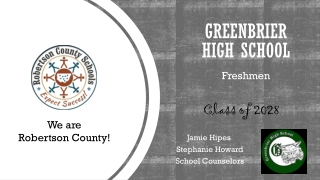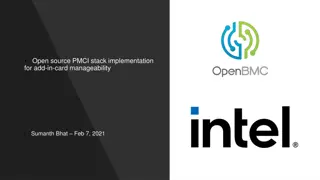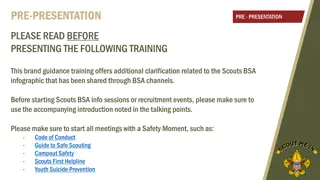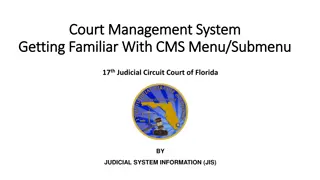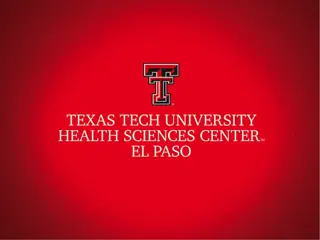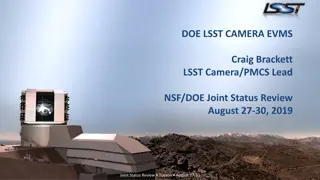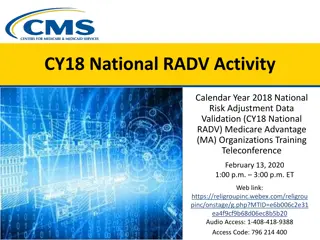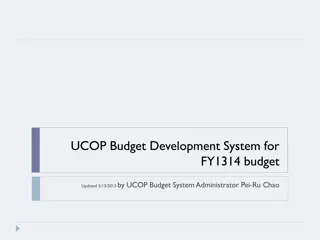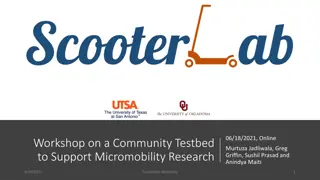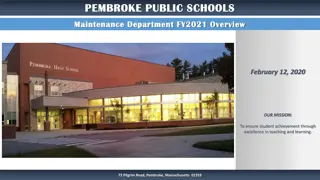Overview of ScooterLab
Uncover a detailed examination of ScooterLabAnindya.Maiti, shedding light on its purpose, content, and potential benefits. Explore the intricacies and peculiarities that make this platform a valuable resource for enthusiasts and researchers alike. Dive into the world of ScooterLabAnindya.Maiti to gain a deeper understanding of its offerings and how it contributes to its community.
Download Presentation

Please find below an Image/Link to download the presentation.
The content on the website is provided AS IS for your information and personal use only. It may not be sold, licensed, or shared on other websites without obtaining consent from the author.If you encounter any issues during the download, it is possible that the publisher has removed the file from their server.
You are allowed to download the files provided on this website for personal or commercial use, subject to the condition that they are used lawfully. All files are the property of their respective owners.
The content on the website is provided AS IS for your information and personal use only. It may not be sold, licensed, or shared on other websites without obtaining consent from the author.
E N D
Presentation Transcript
Overview of ScooterLab Anindya Maiti
Micromobility Micromobility vehicles (e.g., e-scooters) are popular short-distance/last-mile transportation mode in urban communities. Research Challenges: Urban Planning, Transportation & Infrastructure, Pedestrian/Rider Safety and Sustainability. Like other Intelligent Transportation Systems (ITS), a tight integration of various sensor, hardware and software technologies with micromobility vehicles to enable remote sensing and control is required. Research Challenges: User Privacy, Software/Hardware Security, Embedded System/Sensor Design. Moreover, these micro-mobility vehicles can serve as an excellent instrument to crowd- sense contextual and ambient data about the riders and their environment. Research Opportunity: Data for new Machine Learning Algorithms/AI Systems. 2/25/2025 ScooterLab Workshop 2
Why a Micromobility Testbed? Tremendous interest within research communities towards addressing multi-disciplinary challenges that arise in intelligent micromobility transportation systems. Solving these challenges will require access to relevant mobility, sensor and hardware/software systems data collected from realistic (at scale) deployments of such transportation systems. How can researchers gain access to such data for their research? Option 1: Partner with commercial service providers. Challenges: 1. Contractual agreements with customers and fear of misuse by competing providers may prevent data sharing for research. 2. Commercial vehicles may not be fitted (and cannot be easily retro-fitted) with specialized sensor hardware to enable research-grade data collection. Option 2: Highly customized (in terms of scale, on-board sensors, software and hardware), like the one at Virginia Tech Transportation Institute (VTTI). Challenges: 1. Time-consuming and expensive for each research group to build their own testbed. 2. Over-customized testbeds are not useful to others (or for joint use). 2/25/2025 ScooterLab Workshop 3
ScooterLab The Vision A community research infrastructure comprising of a highly customizable fleet of dock-less e-scooters operating on UTSA and OU campuses. This large-scale, multi-user, research testbed: 1. Will allow the flexibility of equipping the testbed vehicles with state-of- the-art sensors in an on-demand fashion depending on experimental/research requirements. 2. Will allow community/participating researchers access to a diverse set of micromobility users/riders and fine-grained data related to their rides, context and surroundings. 2/25/2025 ScooterLab Workshop 4
The ScooterLab Architecture The ScooterLab testbed will comprise of: Vehicles Fleet Controller Research Activities Management Portal (RAMP) 2/25/2025 ScooterLab Workshop 5
ScooterLab - Vehicles A fleet of commercial off-the-shelf dock-less e- scooters will be acquired Each will be retrofitted with a customized controller computer, called Wireless Base Station Computers (WBSC). WBSC s main functionality is to enable remote control of the sensors (e.g., on/off and sensing sampling frequency) on-board the vehicles and certain vehicle operations (e.g., unlock/lock and disabling operation). The project plans to design, develop and integrate (with the e-scooter vehicles) an in-house WBSC module. 2/25/2025 ScooterLab Workshop 6
ScooterLab Fleet Controller Each WBSC will be remotely controlled and managed by a back-end software framework, called Fleet Controller. The two main functionalities of the Fleet Controller: Collect sensed data from the fleet vehicles on- board sensors, and Upload new sensor control and experimental parameters to individual vehicles WBSC in an on- demand fashion. This project plans to design and implement and appropriate Fleet Controller. 2/25/2025 ScooterLab Workshop 7
ScooterLab RAMP Next, the project will implement an (web) interface, called Research Activities Management Portal or RAMP, for community researchers to interact with the testbed. RAMP will provide a dashboard to request deployment of new crowd-sensing experiments. It will enable researchers to download relevant software artifacts and archived datasets from previous experiments. It will integrate a suite of data analytics and data query tools to help researchers understand and navigate the data. 2/25/2025 ScooterLab Workshop 8
Who will Use ScooterLab? Based on our initial outreach, several groups have expressed interest in using ScooterLab: 2/25/2025 ScooterLab Workshop 9
Who will Use ScooterLab? A few representative groups are: Dillon Fitch s group at University of California, Davis is exploring future mobility and emerging transportation services, and behavior and demand modeling using machine/deep learning. Dillon Fitch has expressed interest to extend his research into micro-mobility vehicles such as e-scooters. David Shmoys s group at Cornell University studies applications of discrete optimization techniques to several issues in computational sustainability, and recently started development of algorithm tools to design and support bike-sharing systems. David Shmoys has expressed interest to extend his research into micro-mobility vehicles as well. Flora Salim s group at Royal Melbourne Institute of Technology is working on human mobility and behavior analytics, context and activity recognition, urban computing, and applying machine learning for smart cities and smart buildings. Flora Salim has expressed interest to incorporate micro-mobility vehicles into her research. Mina Sartipi s group at University of Tennessee at Chattanooga works on wireless communications and big data analysis-related research projects in areas of transportation and has expressed interest in research with micro- mobility vehicles. Daniel Work s group at Vanderbilt University works in the areas of connected and autonomous vehicles, mobile sensing, and transportation data analytics, traffic estimation & control, and has expressed interest to extend their research into micro-mobility vehicles. 2/25/2025 ScooterLab Workshop 10
Who will Use ScooterLab? Insights from Workshop 1 held on November 5th, 2020: Data driven scooterist behavior analysis, multi-sensory and crowdsensing based infrastructure assessment Jiannan Cai Sustainability in transportation on campus and surrounding areas, specifically e-scooters via mobile apps utilizing predetermined routes from docking stations, reducing student carbon footprint Anjulie Hira Sensors and privacy & security as well as pricing models with micromobility vehicles Anindya Maiti ScooterLab born with discussion of most effective pricing models among private micromobility companies and how it effects users Murtuza Jadliwala Datasets involving travel behavior traditionally providing location data using GPS pinpoints, traffic and parking violations caused by e scooter users, as well as policies instilled by private companies and cities to combat violations, sidewalk obstruction by e-scooters Shunhua Bai Understanding how short distance travel demand is extremely important in micromobility studies vs. technology component Shunhua Bai Growth of micromobility use in the context of technological innovation and internet availability Greg Griffin 2/25/2025 ScooterLab Workshop 11
From Vision to Reality Through a planning grant from NSF1, the following activities will be carried out: Outreach to grow micro-mobility related research community: Expand the community further to identify other use-cases for ScooterLab. Feedback on the planned infrastructure to satisfy community needs/requirements. Prototype Development: Iteratively develop and improve (through community feedback) proof-of-concept prototypes of ScooterLab vehicles. Plan for other supporting infrastructure and resources needed for ScooterLab (e.g., garage/storage space and university/city partnerships) Education and Technology Updates: Student-focused tutorials, workshops and seminars on micro-mobility research and e-scooter system design. Technology demonstrators at major conferences, workshops and K-12 summer camps. [1] CCRI: Planning: ScooterLab: Development of a Programmable and Participatory e-Scooter Testbed to Enable CISE-focused Micromobility Research , sponsored by National Science Foundation (NSF), $100,000 from August 2020 - February 2022. PI: Murtuza Jadliwala, Co-PIs: Greg Griffin, Sushil Prasad and Anindya Maiti. 2/25/2025 ScooterLab Workshop 12
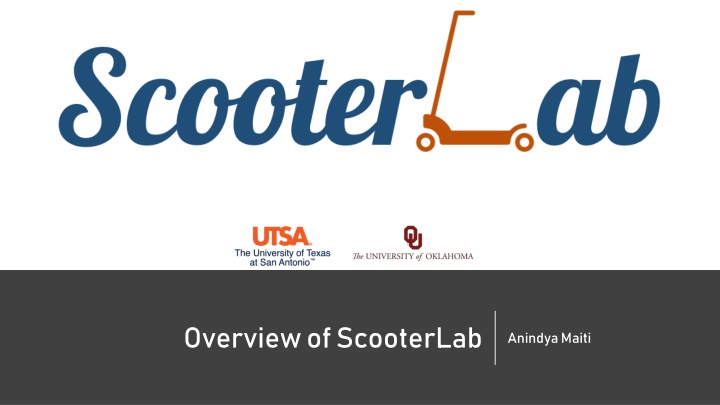

![❤[READ]❤ Deep Space Craft: An Overview of Interplanetary Flight (Springer Praxis](/thumb/21511/read-deep-space-craft-an-overview-of-interplanetary-flight-springer-praxis.jpg)

